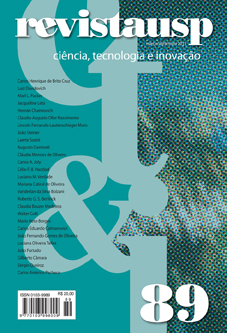Petróleo: energia do presente, matéria-prima do futuro?
DOI:
https://doi.org/10.11606/issn.2316-9036.v0i89p90-97Palavras-chave:
petróleo, técnicas de química analítica, refinaria de petróleoResumo
Hoje, o petróleo e o carvão são responsáveis pela maior parte de geração de energia no mundo. No futuro próximo há poucas perspectivas de mudanças da matriz energética mundial. O processo de combustão de combustíveis fósseis atualmente empregados é extremamente ineficiente sendo boa parte da energia perdida. Enquanto uma revolução tecnológica na área de energia não chega, temos que trabalhar na eficiência e melhor conhecer essa maravilhosa matéria-prima que é o petróleo. A história nos ensina: no fim do século XIX o principal produto obtido do petróleo era o querosene para iluminação, e a gasolina era jogada fora. A grande dúvida ainda é sobre o potencial de inovação nessa área já tão desenvolvida que é a do petróleo. Isso é verdade em termos do uso de petróleo como combustível mas não como um supridor de matérias-primas. A Petrobras hoje tornou-se um novo financiador e organizador de pesquisas científicas e tecnológicas na área de petróleo e energia no Brasil, focando o futuro da indústria do petróleo.
Downloads
Referências
AL-MUHAREB, E.; Morgan, T. J.; HEROD, A. A.; KANDIYOTI, R. “Characterization of Petroleum Alphaltenes by Size Exclusion Chromatography, UV-fluorescence and Mass Spectrometry”, in Petroleum Science&Technology, vol. 25, 2007, pp. 81-91.
FALLA, F. S.; LARINI, C.; ROUX, G. A. L.; QUINA, F. H. ; MORO, L. F. L. e NASCIMENTO, C. A. O. “Characterization of Crude Petroleum by NIR”, in Journal of Petroleum Science & Engineering, v. 51, 2006, pp. 127-37.
LOPES-GENJO, J.; PANTOJA, P. A.; FALLA, F. S.; ROUX, G. A. G. L.; QUINA, F. H. e NASCIMENTO, C. A. O. “Eletronic and Vibrational Spectroscopy for Remote and On-LineE Analysis and Classification of Crude Petroleum”, in Korin L. MontClaire (org.). Petroleum Science Research Progress. Nova Science Publishers, 2008, pp. 187-233.
MARSHALL, A. G.; RODGERS, R. P. “Petroleomics: Chemistry of the Underworld”, in PNAS, vol. 105 (47), 2008, pp. 18.090-5.
MULLINS, O. C.; SHEU, E. Y.; Hammami, A.; Marshall, A. G. Asphaltenes, Heavy Oils, and Petroleomics. Springer Science, 2007.
QIAN, K. “Reading Chemical Fine Print: Resolution and Identification of 3000 Nitrogen-Containing Aromatic Compounds from Single Electrospray Ionization Fourier Transform Ion Cyclotron Resonance Mass Spectrum of Heavy Petroleum Crude Oil”, in Energy&Fuels, vol. 15, 2001, pp. 492-8.
REGALADO, A. “Brazilian Science: Riding a Gusher”, in Science, v. 330, 2010, pp. 1.306-12.
YERGIN, D. O Petróleo: uma História Mundial de Conquistas, Poder e Dinheiro. São Paulo, Paz e Terra, 2010.
Downloads
Publicado
Edição
Seção
Licença
Copyright (c) 2023 Revista USP

Este trabalho está licenciado sob uma licença Creative Commons Attribution-NonCommercial-ShareAlike 4.0 International License.
|
Pertence à revista. Uma vez publicado o artigo, os direitos passam a ser da revista, sendo proibida a reprodução e a inclusão de trechos sem a permissão do editor. |


